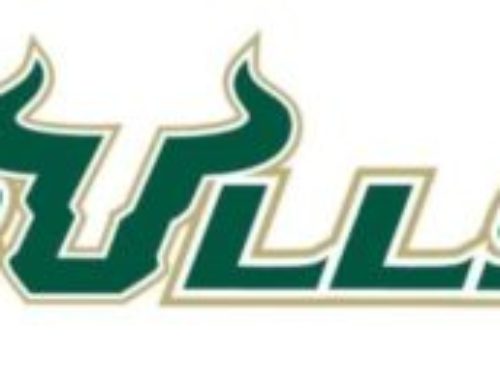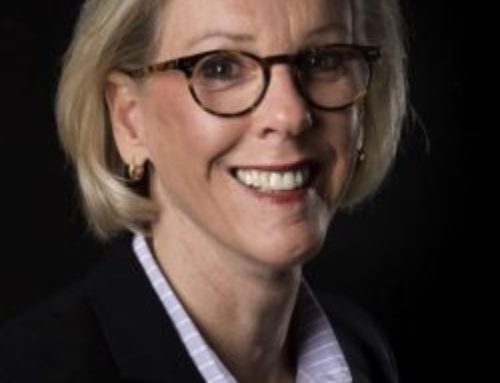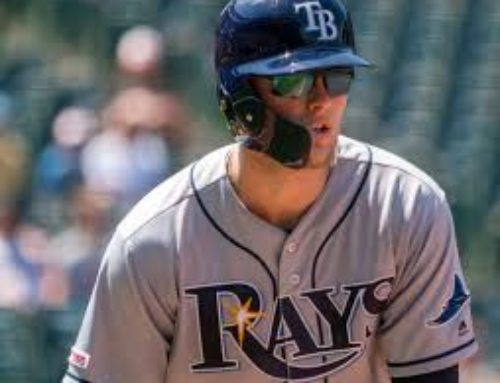Before his days with the Bucs, Derrick Brooks was a leader and competitor in his hometown.
By JOEY JOHNSTON
Tribune Staff Writer
(c) Tampa Bay Times. Originally published Aug. 1, 2014.
TAMPA — Very quickly, visitors to Booker T. Washington High in Pensacola realize that Derrick Brooks once passed through the halls.
His jerseys are displayed in the school atrium, next to a large photograph. The athletic complex bears his name.
All around Pensacola, where football is king and hometown heroes are royalty, it’s evident he’s the favorite son. He never forgot the town, nurturing relationships with people and places still deep in his heart.
The stories about young Derrick Brooks sound like the stories about an older Derrick Brooks. He was a prideful, ferocious competitor, meticulous, a supreme athlete, a leader whose word was bond.
But some qualities can’t be found on the field.
It was a typical Friday night in Pensacola. The Washington Wildcats had won big again, nothing unusual for a program that made the state semifinals in Brooks’ final two seasons. The players, feeling invincible, organized a late-night, feel-good trip to the pizza parlor.
Where was Derrick?
Fellow linebacker Walter Benjamin swung by the house. Brooks was at his kitchen table — studying.
“I’m like, ‘Derrick, can’t you relax? It’s Friday night. We just won a game. Can’t you come out with us and celebrate? You’ve got the weekend to study,’ ” Benjamin said.
“He just looked at me and said, ‘No man, I’ve got to get my books.’ ”
Benjamin laughed.
“He’s a great football player,” Benjamin said. “But there are a lot of great football players in America. If you look at the complete package, the academics, the character, the leadership and the football, I never saw anybody else like Derrick Brooks.
“He was different.”
‘Those parents raised Derrick right’
So much has contributed to this end result.
Most people in Pensacola remember the beginning.
“Whatever happened in that house, that was the right stuff,” said Jimmy Nichols, who was Brooks’ head coach at Washington High. “Those parents raised Derrick right. The grandmother was his life. It’s not anymore complicated than that.”
The grandmother, Martha Brooks, always made time for others. She made Derrick run errands for friends who couldn’t help themselves. She cooked for everyone.
“My whole theme of life is relationships, connections, and I would say it started with my grandmother,” Brooks said.
Sometimes, Brooks saw strangers in his home.
“With her (grandmother), it wasn’t a question of who this is, it was, ‘Welcome — and how can we help you?’ ” Brooks said. “That’s the type of environment she set.”
The grandmother, who died in 1999, was warm and nurturing. His parents were loving, too. But they were also the law.
Geraldine Brooks-Mitchell, who died in 2007 after a lengthy bout with cancer, demanded excellence. Even in a home that he purchased for her, whenever Brooks returned to Pensacola as the much-decorated NFL star, his mother always made him take out the garbage.
Once, she was an athlete, a star basketball player at Washington High, about three years before the sport was officially sanctioned for girls in Florida. She could stop and pop from long range. She was a physical, aggressive rebounder. Almost certainly, she could’ve played for a Division I program.
“Everything you think about with quickness and athleticism with Derrick, that was Geraldine, too,” said Ronnie Bond, for 38 years a football assistant and head girls basketball coach at Washington High, whose wife initially coached Brooks’ mother. “Other girls would back down. She was unafraid.
“And I’ll say this, Geraldine would bite the head off a snake. I think she could’ve been really, really great.”
In her senior year, Geraldine became pregnant with Derrick. He was born in April. Geraldine graduated from Washington High in June.
Whatever dreams she had — and athletically, girls had very few opportunities — they were poured into the baby.
She became a life-of-the-party tailgater around Raymond James Stadium when Brooks played for the Bucs. Back home, though, when Brooks was being raised, she wanted A’s on the report card. “Don’t wear your britches too high,” she said, particularly when things went well.
“I hate to use the word ‘guilty,’ but I always felt the need to succeed because my mom didn’t get a chance to finish her education (in college),”
Brooks said. “She was my biggest supporter.”
Meanwhile, Brooks’ stepfather, A.J. Mitchell, was a no-nonsense man who worked at this and that, serving as co-owner of a taxi, fixing cars, anything to bring in money.
Most of the time, things were tight. Brooks studied while sitting on top of a cooler that kept the cold drinks and sandwiches. It was the family refrigerator. Once, there wasn’t money to pay the electric bill, so he studied by candlelight. Sometimes, there was no running water, so he went to the 7-Eleven and filled up a bucket. He shared a bed with his younger brother, Anthony.
“It was really borderline abject poverty,” Anthony Brooks said. “But there was so much love from our parents. We didn’t know how bad we had it.”
But there were great lessons, which still serve as guideposts for Brooks. He still remembers his stepfather’s words:
When you toot your own horn, that’s one breath. If everyone else is tooting your horn, the sound goes on forever.
Brooks chooses defense
At first, football didn’t seem to fit. When he got serious at age 12 with the Catalonia Baby Rattlers, Pop Warner ball, he tried quarterback. After getting demolished on a sack, he walked to the sideline, teary-eyed. He asked the coach about revenge.
“Go play defense, line up in the middle and go to the ball,” the coach said.
Those words shaped a football future.
“I fell in love with the chase,” Brooks said.
At Washington High, Nichols said, Brooks arrived as an average performer, but matured into a major player. It wasn’t so much his muscle or his speed. It was more his will.
“When he got there at the point of attack, he would lay on the most ferocious licks I’d ever seen,” said Nichols, the Washington High head coach. “He always arrived in a bad mood. I could hear him tackle. I knew it was Derrick making the tackle.”
“Derrick was consistently making plays the average kid didn’t come close to making,” said Bond, the Washington High offensive coordinator.
Benjamin, one year younger than Brooks, began his high-school career as a running back. It didn’t last long.
“He’s the reason I eventually moved to linebacker,” Benjamin said. “He hit me so hard, I got dizzy. I told the coach, ‘I want to play football, but I will not run the ball any more until Bo (Brooks’ nickname) graduates. I won’t do it.
“So, I end up playing right next to Bo, which was great. He was like a magnet. You know how they give you those stickers for your helmet, based on how you grade out? He always got the most stickers. He ran out of room. I was like, ‘Where are my stickers?’ ”
Brooks became a prep All-American performer, the USA Today Defensive Player of the Year in 1990. But he was proudest of another award.
Ultimate scholar athlete
Brooks won the Dial Award, presented to the nation’s foremost high school scholar athlete.
The athlete portion was a given. But the scholar accomplishments, although not as widely known, were even more impressive.
Brooks graduated 10th in a class of 435 students at Washington High, earning a 4.22 grade-point average. He carried that over to a 3.94 GPA at FSU and a graduate degree (3.88 GPA).
“It didn’t come easy for Derrick,” Nichols said. “He worked like crazy.”
Brooks said he was driven to avoid the “dumb jock” label. No concerns there. Benjamin, his football teammate, referred to Brooks as a “brainiac.”
Other athletes ridiculed Brooks, calling him a nerd, saying, “You think you’re better than us?” Undaunted, Brooks took a full load of honors courses at Washington High.
“In my high school classes, there was no one else who looked like me,” Brooks said. “I was fighting a whole different battle.”
Friends taunted him for “going down that other hallway,” where honors courses were held.
He glared back: “Why don’t you come down and let me show you what it looks like. Matter of fact, I could use a little company.”
Brooks said one teacher, unaccustomed to having a black male student, insisted he sit in the front row.
“I said, ‘Good, that’s where I want to be,’ ” Brooks said. “Then she sat everybody alphabetically and I said, ‘Don’t move me. Please! Let me stay here. I don’t want you to think I’m going to be cheating to make all A’s. Everybody is going to cheat off me. The only reason you’re going to know that is because I’m sitting in front of you.’
“I was very comfortable in my own skin as a human being. I wasn’t looking for acceptance. When you do that, then you’re trying to be something you’re not. I was very comfortable with who I was.”
In time, all of Pensacola appreciated who Derrick Brooks was — and who he still is today.
“My gosh, Derrick could be instantly elected mayor of Pensacola,” Bond said. “He’s as beloved as beloved can be.”
“Pensacola carries that feeling of home,” said Carol Brooks, his wife, a Washington High graduate. “That’s his foundation. Mine, too. You don’t forget where you come from.”
Pensacola never forgets about Derrick Brooks, either. It’s not possible for a town to be any more proud.
“I was at Bo’s game in Tampa once and I told him, ‘Man, you made it,’ ” Benjamin said. “He looked at me and said, ‘No, we made it. All of us. I’m representing everybody in Pensacola.’
“When they put that jacket on him, I’m probably going to cry. We’re proud that Derrick Brooks is one of us.”





